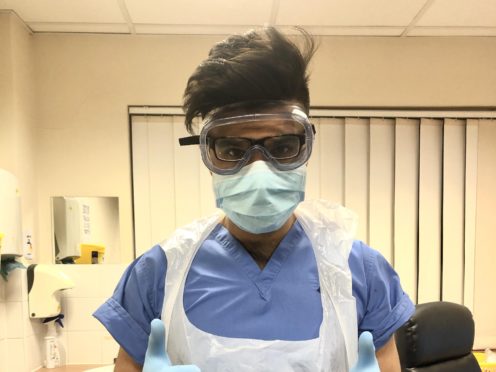A Muslim NHS doctor working on the frontline of the coronavirus crisis has said he hopes a new Channel 4 docu-series shines a light on the BAME healthcare workers putting themselves in harm’s way.
Dr Mohammed Abbas Khaki, who is volunteering in A&E at a London hospital, is one of the stars of Ramadan In Lockdown, in which people from all around the country self-filmed their experiences of observing the month of fasting and prayer while in lockdown.
Earlier this month, it was revealed that black and minority ethnic (BAME) healthcare staff are being offered specialised assistance following reports that coronavirus deaths among them are disproportionately high.

Dr Khaki, 34, told the PA news agency: “Ramadan is normally a time where you take time off and take some time to calm your schedule and maybe take some annual leave – and this time it was actually a time of increasing the amount of work you do, all hands to the decks.”
He added: “The unprecedented nature of what is happening adds a bit of mental burden. Normally when you’re fasting you may not have food but you get spiritual energy, that keeps you going.
“This time a lot of your mental energy has been on what is happening with coronavirus and that has been exhausting.
“But also it’s really exhausting working in PPE because it’s so suffocating and I think when you’re fasting, PPE dehydrates you, we used to drink a lot of water in between and when you’re fasting you’re already thirsty so I think that has been an extra added challenge.
“But the beautiful part of it has been how you marry up your faith with your work, so your faith talks about how you need to improve yourself, how you need to use this time to develop and actually when you’re working and helping and serving other people you almost feel like you’re in this amazing marriage of your faith coming into practice, so it’s quite a nice feeling.”
Discussing the impact the crisis has had on BAME frontline workers, he said: “I think this was an opportunity to showcase that, as a BAME healthcare worker, it’s my duty but it’s my honour to go and serve, but it’s important that we recognise that there are a lot of other BAME healthcare workers out there who are doing this as well.

“One thing that I particularly think about is how when we clap on a Thursday, we have to remember that 10-14% of the people we are clapping don’t identify themselves as British in origin.
“We are clapping people who a few months ago we might have been saying ‘get out of our country, you’re not welcome here,’ we had this odd undercurrent of xenophobia, or racism, but actually now we are clapping them every week, saying ‘we recognise how much of an amazing effort, how much bravery, you’re demonstrating for the greater good’.
“I think it’s really important after this crisis calms down, after we get over it, that we remember that. If personal stories and names and faces helps to remind us of that, I think it’s really powerful and really helpful.”
Producer Farah Qayum added: “I’ve worked on a lot of programmes about the Muslim community and one of the fears always is that they are a community that are misunderstood and are often not represented well.
“So I think whatever we can do to debunk some of the myths and bigotry out there is always something that I personally want to do.
“And for many of the people that have taken part, I think that is part of the reason they wanted to do it, they want to show that they are just like any other Briton out there and actually the challenges that they face are sometimes greater.
Ramadan in Lockdown, a five-part series, starts on Channel 4 on May 18 at 11:05pm, and culminates in an Eid special on May 23 at 11.20pm.
